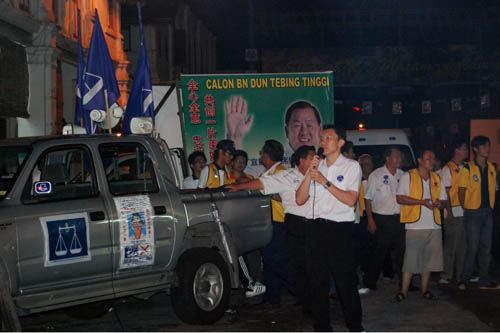
By Cindy Tham
cindytham@malaysiavotes.com
IPOH: For a city that is famous for its tauge (beansprouts), kuey teow noodles and chicken rice, the street where perhaps the two most popular restaurants that serve them are located is undoubtedly a good place to reach a captive audience.
By dusk, the dinner crowd begins filling the tables that are placed on the roadside outside Restoran Lou Wong Tauge Ayam Kuetiau, and diagonally across the street, Restoran Ong Kee Tauge Ayam. Later, other patrons will show up for supper and linger till late into the night.
It came as no surprise then when I was told that the Barisan Nasional (BN) was having a ceramah there on March 1. It was set up by the Tebing Tinggi state seat (N26) incumbent candidate Chew Wai Khoon from MCA. Contesting against him is the DAP’s Ong Boon Piow.
Tebing Tinggi is part of the Ipoh Timur (P64) parliamentary constituency, where newcomer Dr Liew Mun Hon (BN-MCA), who joined the MCA only four years ago, is taking on incumbent Lim Kit Siang, the DAP and Opposition leader who has been in politics for more than 40 years.
Ipoh Timur has 76,647 voters, 81.5% of whom are Chinese, 12.8% Malay, 5.0% Indian and 0.7% others. In the 2004 general election, the Tebing Tinggi and Canning state seats were won by the BN and the Pasir Pinji state seat by the DAP.
In a telephone conversation with Liew that afternoon – part of my effort to find out more about what the MCA is doing in its campaign and to check out its ceramah – he said his itinerary that day was lined up with one event after another. After house-to-house canvassing, he was scheduled to attend a campaign dinner, speak at a ceramah at the community hall in Pasir Pinji and then mosey along to another ceramah in the city centre, at the famous chicken rice place on Jalan Yau Tat Shin.
We agreed to meet another day but I was bent on sussing out the MCA ceramah that night. This was because it has been quite easy to find the DAP ceramahs, which were taking place just about every night and drawing a huge crowd of people who didn’t mind standing for hours listening to the fiery oratory. I am told that in Ipoh, the MCA prefers to meet small groups, do door-to-door canvassing, and hold fewer ceramahs compared to the opposition – which a number of MCA campaign workers confirmed. “The people find the DAP ceramahs entertaining, with sensational attacks on the BN. We don’t do that. We prefer to tell them what we can do for them,” one campaign worker said.
Aside from the entertainment, the opposition ceramahs tend to attract a larger crowd because the people want to hear what the opposition has to say, which does not always get reported by the traditional media. Thus, in a constituency like Ipoh Timur where the incumbent is from the DAP, it looks like it is the MCA that is lagging behind on the ceramah trail.
The MCA ceramah at the chicken rice place began at about 10pm. Several speakers, including the Tebing Tinggi incumbent, Chew, took turns to lament the lack of development in Ipoh, which they said was a city without the features of a real city. They questioned the missing Member of Parliament (MP), whom they complained was hardly seen in his constituency after being elected in 2004. They questioned what he had done for the city other than make a lot of noise in Parliament about a host of national issues, but no issues from Ipoh Timur specifically.
“What has Lim Kit Siang done for Ipoh? Has he brought any progress or development?” they said. “So what if he makes a lot of noise in Parliament for 30 days when it is in session? There are 365 days in a year. Where is he when Parliament is not in session?”
However, Lim dismissed the “missing MP” accusation. After a packed DAP ceramah at one end of Jalan Kampar on March 2, he told MalaysiaVotes.com, “The role of an MP is to speak up for the people, to voice their problems and aspirations, to speak up on nation-building. Not just during the Parliament session but daily.” He added that his service centre in Ipoh Timur has been attending to local concerns.
MCA’s promises
At the MCA ceramah, the speakers declared the government’s development plans to revive Ipoh, to transform it from a “dead” city into a thriving commercial area. The speakers all cited the BN-MCA nine-point development plan to stop the economic decline in Ipoh and Perak. The measures include:
* a highway linking Ipoh and Lumut to revive the port in Lumut;
* a four-lane expressway between Kampar and Ipoh to catapult Universiti Tunku Abdul Rahman (Utar) into a regional education centre;
* setting up a medical school in Utar with a medical research and development centre to provide medical service and promote health tourism;
* setting up an international airport;
* refurbishing the state’s premier schools;
* crime prevention measures such as closed circuit television, neighbourhood watch groups, and dialogue and cooperation with the police;
* making Perak a major food supplier in the country and helping farmers to obtain land;
* pushing for the double-tracking railway system linking Kuala-Lumpur-Ipoh-Butterworth-Padang Besar; and
* seeking financial assistance from the government to help businesses.
The speakers were also wont to cite what they deemed to be the MCA’s latest big success in helping the people. On Feb 10, Prime Minister Datuk Seri Abdullah Ahmad Badawi presented 931 farmers in Bidor, Kampar and Chemor with a 30-year land lease each, which is part of the government’s efforts to legalise farming activities on land there. These farmers, many of whom are Chinese, have been farming on the land for decades, some since before Independence in 1957. They finally got their wish after the long wait, and just three days before Parliament was dissolved to make way for the general election
![Chew [R-L] and Liew walking out of a restaurant after meeting the patrons](https://www.malaysiavotes.com/wp-content/uploads/2008/03/liew2.jpg) The MCA has helped to raise funds for many Chinese schools and obtained land titles for the farmers, Chew echoed the earlier speakers. “We need to maintain the MCA’s position in the BN so that the Chinese can continue to be represented,” he said. “The opposition won Ipoh Timur and Ipoh’s development has suffered as a result.” The campaign workers standing around and some of the patrons at one restaurant clapped and hooted in support. The audience was mainly the people at the restaurants and passers-by, who lingered for a few minutes before moving on.
The MCA has helped to raise funds for many Chinese schools and obtained land titles for the farmers, Chew echoed the earlier speakers. “We need to maintain the MCA’s position in the BN so that the Chinese can continue to be represented,” he said. “The opposition won Ipoh Timur and Ipoh’s development has suffered as a result.” The campaign workers standing around and some of the patrons at one restaurant clapped and hooted in support. The audience was mainly the people at the restaurants and passers-by, who lingered for a few minutes before moving on.
Liew, who attended SRJK Sam Tet and Poi Lam High School, arrived a little after 11pm. The engineer, who has degrees from Melbourne University and the Royal Melbourne Institute of Technology in Australia, and a doctorate in operation research and project management from the American University of Hawaii, told the crowd about his disappointment with the lack of good career opportunities in Ipoh.
He said Ipoh has suffered a brain drain and the locals have chosen to work in Kuala Lumpur or oversees after graduating. “Give me a chance to bring human capital development, and development to Ipoh,” he said.
Later, as he went around meeting the people who were tucking into bowls of kuey teow and chicken, he said to the younger patrons, “We’re part of the younger generation. Give me a chance to bring about change.”
